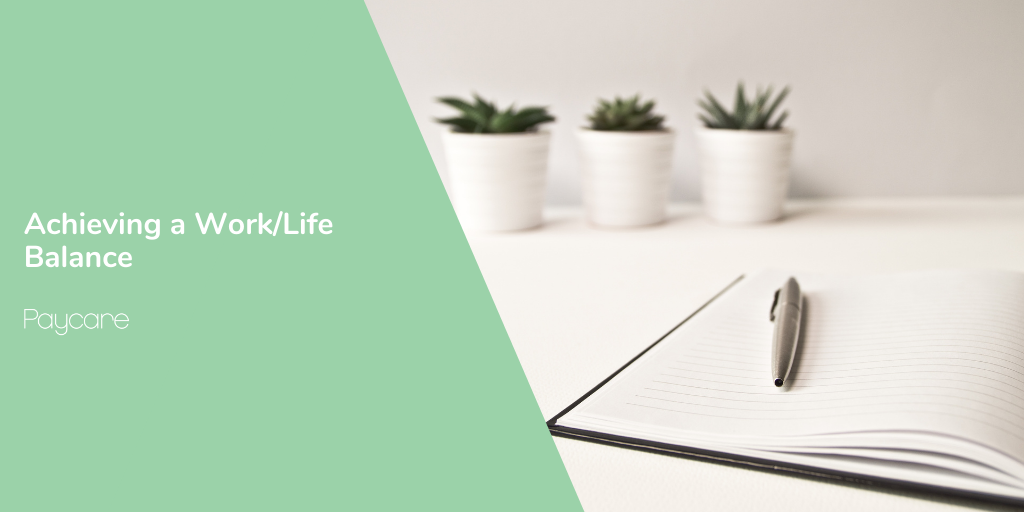Work/life balance has been a very hot topic amongst businesses and their employees over the past 18 months, following the Coronavirus pandemic, with ways of working changing and adapting for many. And it’s no surprise that it’s estimated around 60% of us will work from home more regularly in the future.
But while this shift is to be welcomed from the perspective of allowing more freedom and flexibility, there’s a danger that we’re all forgetting how to disconnect from our work, says our Wellbeing Manager, Kerry Mitchell:
“The boundaries between personal and professional have blurred more than ever in 2020, and you may be finding yourself answering emails throughout the evenings and weekends, forgetting to eat lunch because you’re so engrossed in a task, or feeling the mental and physical ill-effects of staring at a screen for the majority of your waking hours.
If that sounds like you, then you’re not alone. But you do need to act now to establish new routines and practices that will help you divide your home and work lives, even if your house is now your workplace.
The most important habit everyone working from home should bear in mind is the need to take a regular break. UK law allows for a 20-minute uninterrupted break if you’re working more than six hours a day, 11 hours between shifts, and at least one 24-hour period a week where you’re not working2. Display Screen Equipment regulations also suggest a screen break of between five and ten minutes, or a change of activity, every hour3.
Sitting in one position and staring at a screen for hours on end has so many negative effects such as eye strain, high blood pressure, and musculoskeletal pain – as well the impact on your mood and fatigue levels if you’re working constantly.
Think about when you’re physically in the office: you probably don’t come in and sit at your desk for 8 hours, you’ll stop to chat to a colleague, get up to put the kettle on, and potentially move away from your computer for lunch. And you absolutely should replicate those conditions at home and do whatever it takes to ensure you’re having breaks – set regular alarms on your phone, place your water out of reach, or schedule in a mid-morning walk around the block.
As well as setting up a routine, and ensuring your colleagues and clients know when they can speak to you at work and when you’ll be switching off, it’s important to make distinctions between personal and professional.
That might be sticking to core working hours, getting dressed as if you’re going to work and then changing into casual clothes when you’re not working, or setting up a work station in a part of the house and physically getting up and going into another area or room at the end of the day.
Much like you probably have a morning and an evening routine, you could also set up a post-work routine. Schedule a walk, a phone call with a friend, or another activity you’ll enjoy each weekday at 5pm (or whatever time you finish work) to get you to stop and turn off your computer in time rather than working over.
And do bear in mind that you’re entitled to that time without unnecessary interruptions – so you can absolutely change your setting so work emails don’t come through to your personal phone. There will always be times when emergencies require a call in the evenings or weekends, or a busy schedule means you need to put in some overtime – but this should be the exception not the rule.
There’s no use going on a walk if you’re constantly stopping to check your phone, and the same is true of any of your personal time – it’s simply not the same if you’re constantly occupied with thoughts of work.
Remember you’re a person, not just a job, and you deserve time and care too!”
Thanks much for sharing your insight Kerry – there are many top tips in there we can all take away and practice whilst being at home!
It’s so important that we all try to maintain a work/life balance, switching off and taking care of our physical and mental health and wellbeing 😊🧡
For more information about our monthly FREE hour-long e-clinics focused around employee mental health, and to learn more about our Mental Health First Aid Training courses, head to: www.paycare.org/mental-health-first-aid/ 💻 You can also download our Workplace Wellbeing Brochure here: https://www.paycare.org/workplace-wellbeing/ 🧡
Sources:
- https://www.thehrdirector.com/business-news/future-of-work/uk-workers-say-they-will-continue-to-work-from-home-after-lockdown-is-eased-and-majority-are-happy-to-wait-another-month-before-returning-to-the-office/
- https://www.gov.uk/rest-breaks-work
- https://www.hse.gov.uk/msd/dse/work-routine.htm

